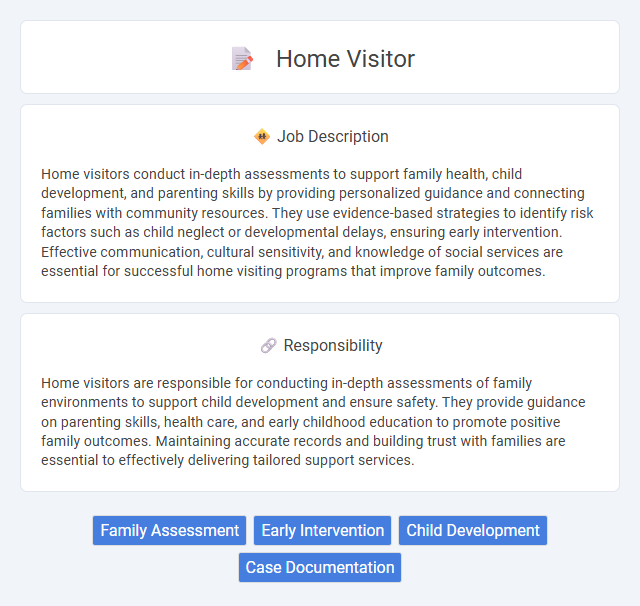
Home visitors conduct in-depth assessments to support family health, child development, and parenting skills by providing personalized guidance and connecting families with community resources. They use evidence-based strategies to identify risk factors such as child neglect or developmental delays, ensuring early intervention. Effective communication, cultural sensitivity, and knowledge of social services are essential for successful home visiting programs that improve family outcomes.
Home visitor roles may suit individuals who possess strong communication skills, empathy, and patience, as they frequently interact with families facing various challenges. Those comfortable working in diverse and sometimes unpredictable environments are probably more effective in addressing clients' needs. Candidates with resilience and adaptability tend to be better equipped to handle the emotional demands and complex social situations inherent in this job.
Qualification
Home visitor jobs require candidates to possess a minimum of a bachelor's degree in social work, psychology, or a related human services field. Certifications in early childhood development, family counseling, or health education enhance employability and effectiveness in delivering support services. Strong communication skills and experience in community outreach are essential for successful home visitation and client engagement.
Responsibility
Home visitors are responsible for conducting in-depth assessments of family environments to support child development and ensure safety. They provide guidance on parenting skills, health care, and early childhood education to promote positive family outcomes. Maintaining accurate records and building trust with families are essential to effectively delivering tailored support services.
Benefit
Home visitor jobs likely offer significant benefits such as flexible scheduling and meaningful community impact, which may enhance job satisfaction. These roles probably provide opportunities for professional growth through direct interaction with diverse families, fostering cultural competence and communication skills. There is a good chance that employees receive supportive training and resources, contributing to both personal and career development.
Challenge
Home visitors probably face challenges related to building trust with diverse families in sensitive environments. They may often encounter situations where limited resources and complex social issues hinder progress, requiring adaptability and problem-solving skills. Managing emotional stress and maintaining professional boundaries could also be significant challenges in this role.
Career Advancement
Home visitor jobs offer significant opportunities for career advancement in social services and public health sectors. Professionals can progress into supervisory roles, program management, or specialized positions such as child development specialists and family support coordinators. Earning certifications and pursuing higher education in social work or early childhood education enhances career growth potential and increases earning capacity.
Key Terms
Family Assessment
Home visitors conduct comprehensive family assessments to evaluate the health, safety, and developmental needs of children within their home environments. They gather detailed information on family dynamics, socioeconomic status, and parental capabilities to tailor support services effectively. Accurate family assessments enable targeted interventions that promote child well-being and strengthen family resilience.
Early Intervention
Home visitors in Early Intervention play a critical role in supporting infants and toddlers with developmental delays by providing personalized guidance and resources directly to families in their homes. They collaborate with multidisciplinary teams to assess children's needs, implement tailored developmental activities, and monitor progress to enhance communication, social, and motor skills. These professionals ensure early identification and intervention, promoting optimal child development and stronger family engagement during crucial early years.
Child Development
Home visitors play a crucial role in supporting child development by providing personalized guidance to families on early childhood growth milestones. They assess children's cognitive, emotional, and physical progress while offering strategies to enhance language acquisition and social skills. These professionals often collaborate with healthcare and educational specialists to ensure comprehensive developmental support tailored to each child's needs.
Case Documentation
Accurate case documentation is essential for home visitors to effectively track client progress and ensure compliance with program standards. Detailed records of visits, observations, and interventions support personalized care plans and facilitate communication with healthcare providers and social services. Efficient documentation also aids in identifying patterns, measuring outcomes, and securing funding for continued home visitation programs.
 kuljobs.com
kuljobs.com